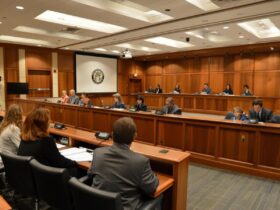Introduction To The Capital One Lawsuit
Overview Of The Lawsuit
The Capital One lawsuit is a legal case where the bank is being sued. The lawsuit began after a significant data breach. Hackers stole personal information from Capital One customers. This data included names, addresses, and credit scores. The breach affected millions of people.
Significance Of The Case
The Capital One lawsuit is important because it highlights issues of data security and privacy. The case shows how a major financial institution can be vulnerable to cyberattacks. It also raises questions about how well companies protect customer information. The outcome of this case could lead to changes in how businesses handle data security.
Key Facts And Figures
In the Capital One lawsuit, it was revealed that the breach impacted around 100 million people in the U.S. and 6 million in Canada. The stolen data included details from over 30,000 credit card applications. The lawsuit has led to significant legal and financial consequences for Capital One.
Background Of Capital One
Brief History Of Capital One
Capital One was founded in 1994 by Richard Fairbank and Nigel Morris. It started as a credit card company and quickly grew. By the early 2000s, Capital One expanded into other financial services, including loans and banking. The company became one of the largest banks in the U.S., known for its innovative approach to credit and technology.
Overview Of Its Business Operations
Capital One offers a range of financial products and services. This includes credit cards, savings accounts, auto loans, and commercial banking. The company serves millions of customers through its online and physical branches. Capital One is known for its use of technology to provide convenient and efficient banking services.
Importance In The Financial Sector
Capital One plays a significant role in the financial sector. It is one of the largest credit card issuers in the U.S. and a major player in the banking industry. The company’s focus on technology and customer service has made it a key competitor in the financial market. Capital One’s innovations and business practices influence other financial institutions and shape industry trends.
Details Of The Capital One Lawsuit
What Prompted The Lawsuit
The Capital One lawsuit was prompted by a significant data breach in 2019. Hackers accessed sensitive customer information, including names, addresses, and credit scores. This breach exposed the personal data of over 100 million people. The incident led to a lawsuit because customers and regulatory agencies were concerned about Capital One’s failure to protect this information.
Key Allegations And Claims
The key allegations in the Capital One lawsuit include claims that Capital One was negligent in its data security practices. Plaintiffs argue that the bank did not take adequate measures to prevent the breach. They claim that Capital One failed to properly secure its systems, which allowed hackers to gain unauthorized access to sensitive data. The lawsuit also alleges that the breach caused financial harm and privacy violations to customers.
Parties Involved In The Lawsuit
The primary parties involved in the Capital One lawsuit are Capital One itself, the plaintiffs (customers affected by the breach), and various regulatory bodies. The lawsuit also involves the individual accused of carrying out the hack, Paige Thompson, who was an employee of Capital One at the time of the breach.
Legal Proceedings and Developments in the Capital One Lawsuit
Timeline Of Key Events
- July 2019: A data breach at Capital One is publicly disclosed, affecting over 100 million customers.
- August 2019: Capital One reports the breach to regulators and the public. Paige Thompson, the alleged hacker, is arrested.
- September 2019: Capital One faces multiple lawsuits from affected customers and regulatory bodies.
- February 2020: A significant class-action lawsuit is filed against Capital One, seeking damages for affected customers.
- June 2021: Capital One reaches a settlement with the U.S. Office of the Comptroller of the Currency (OCC) over regulatory penalties.
Major Court Rulings And Decisions
- August 2020: A federal court rules that Capital One must face the class-action lawsuit. The court decides that the plaintiffs have sufficient grounds to proceed with their claims.
- March 2021: The court denies Capital One’s motion to dismiss the lawsuit, allowing the case to move forward. The ruling emphasizes the need for a thorough investigation into the bank’s data security practices.
Current Status Of The Lawsuit
The Capital One lawsuit is ongoing. Capital One has reached settlements with some regulatory bodies and continues to address the claims made by affected customers. The legal proceedings are focused on determining the extent of the bank’s liability and the compensation for impacted individuals. The case remains significant as it continues to influence discussions on data security and consumer protection.
Impact on Capital One
Financial Repercussions
The Capital One lawsuit has had significant financial repercussions. Capital One faced substantial costs related to legal fees and settlements. The bank agreed to pay millions of dollars in fines and compensation to affected customers. The breach also led to increased expenses for improving security measures and compliance. These financial impacts have affected the company’s profitability and financial stability.
Impact On Company Operations
The Capital One breach forced the company to make substantial changes to its operations. The bank had to invest heavily in upgrading its cybersecurity infrastructure to prevent future breaches. It also faced increased scrutiny from regulators, leading to more rigorous compliance measures. These changes have affected the bank’s day-to-day operations and its approach to managing customer data.
Reactions From Stakeholders And Investors
Reactions from stakeholders and investors have been mixed. Some investors expressed concern about the financial impact and reputational damage caused by the breach. They worried about the long-term effects on Capital One’s market position and customer trust. On the other hand, stakeholders appreciated the company’s efforts to address the issues and improve security. Capital One has worked to restore its reputation by demonstrating a commitment to better data protection and transparency.
Impact On Consumers
How The Lawsuit Affects Capital One Customers
The Capital One lawsuit has had a direct impact on customers. Many people experienced anxiety and stress over the exposure of their personal data. Customers faced potential risks of identity theft and financial fraud due to the breach. Additionally, affected individuals had to spend time monitoring their credit reports and addressing any issues resulting from the stolen data.
Changes In Customer Policies Or Services
In response to the lawsuit and data breach, Capital One made several changes to its customer policies and services. The company implemented stronger security measures to protect customer information. It also revised its privacy policies to enhance transparency about data handling practices. Capital One improved its customer service protocols to better address concerns and provide support to affected individuals.
Steps Taken To Address Consumer Concerns
To address consumer concerns, Capital One took several steps. The bank offered free credit monitoring and identity theft protection services to affected customers. It also established a dedicated support team to assist with any issues related to the breach. Additionally, Capital One has focused on improving its communication with customers to keep them informed about security updates and preventive measures.
Legal And Regulatory Implications
Legal Precedents Set By The Case
The Capital One lawsuit has set important legal precedents regarding data security and corporate responsibility. Courts have emphasized the need for companies to take robust measures to protect customer data. The case has highlighted the legal consequences of failing to secure sensitive information, influencing how future lawsuits may be handled. It also underscores the importance of proving negligence in data protection cases.
Regulatory Changes Or Scrutiny
The Capital One breach has led to increased regulatory scrutiny on data security practices. Regulators have introduced stricter guidelines and standards for how financial institutions manage and protect customer information. The breach has prompted updates to data protection laws and regulations, making it clear that companies must adhere to higher standards of security and transparency.
Implications For Other Financial Institutions
The Capital One lawsuit has significant implications for other financial institutions. Banks and financial companies are now under greater pressure to improve their cybersecurity measures. The case serves as a warning about the risks of data breaches and the potential legal and financial consequences. Other institutions are likely to review and enhance their security practices to avoid similar issues and comply with new regulatory requirements.
Public And Media Reactions
Public Perception Of The Lawsuit
The Capital One lawsuit generated widespread public concern and scrutiny. Many people were alarmed by the scale of the data breach and the potential risks to their personal information. Public perception was largely negative, with many viewing Capital One as having failed to adequately protect customer data. The lawsuit heightened awareness about the importance of data security and the responsibilities of financial institutions.
Media Coverage And Analysis
Media coverage of the Capital One lawsuit was extensive. News outlets reported on the breach, its impact on customers, and the legal proceedings. Analysis focused on the company’s data security practices and the broader implications for the financial industry. Reports highlighted the scale of the breach, the steps Capital One was taking to address the situation, and the legal and regulatory consequences. The media also examined how the case might influence future data protection practices.
Notable Public Statements Or Reactions
Several notable public statements and reactions emerged from the Capital One lawsuit. Capital One executives publicly apologized for the breach and committed to improving security measures. Regulators and privacy advocates criticized the company’s handling of data security and called for stronger protections. Affected customers voiced their concerns about the breach, demanding better security and compensation. Public statements from legal experts and industry analysts discussed the case’s implications for data privacy and corporate responsibility.
Capital One’s Response
Official Statements From Capital One
Following the data breach, Capital One issued several official statements. The company apologized for the breach and expressed regret over the impact on its customers. Capital One emphasized its commitment to addressing the issues and improving data security. The statements outlined the company’s steps to cooperate with regulators and support affected individuals.
Measures Taken By The Company To Address The Issues
Capital One took multiple measures to address the data breach and its aftermath. The company implemented enhanced cybersecurity protocols, including more rigorous data protection and monitoring systems. It offered free credit monitoring and identity theft protection services to affected customers. Capital One also worked to improve its internal practices and employee training to prevent future breaches.
Future Strategies And Outlook
Looking ahead, Capital One plans to focus on strengthening its cybersecurity infrastructure and maintaining transparency with customers. The company aims to rebuild trust by continuously improving its security measures and complying with updated regulatory standards. Capital One’s future strategies include investing in advanced technology to safeguard data and enhancing its crisis management procedures to better respond to potential security threats. The company remains committed to addressing any remaining concerns and ensuring robust protection for its customers.
Conclusion
The Capital One lawsuit arose from a major data breach in 2019, where hackers stole personal information from over 100 million customers. The breach led to significant financial costs, legal battles, and regulatory scrutiny for Capital One. The company faced lawsuits and fines, resulting in substantial changes to its data security practices and customer policies. The case underscored the critical importance of safeguarding personal information and holding companies accountable for their data protection failures. For Capital One, the lawsuit has highlighted the need for continuous improvement in data security and compliance. The company must stay vigilant against cyber threats and adapt to evolving regulatory requirements.
For the financial industry as a whole, the case has set a precedent for handling data breaches and has prompted other institutions to enhance their cybersecurity measures. The increased regulatory oversight and public awareness are likely to drive broader industry changes, focusing on more robust data protection practices. The Capital One case serves as a crucial lesson in the importance of data security and corporate responsibility. Moving forward, Capital One should continue to prioritize cyber security, maintain transparency, and address customer concerns proactively. The financial industry should learn from this incident by strengthening its security frameworks and preparing for potential threats. Overall, the case emphasizes the need for ongoing vigilance and adaptability in protecting sensitive information in an increasingly digital world.
FAQs
Q. What was the Capital One lawsuit about?
The Capital One lawsuit was about a data breach in 2019 where hackers stole personal information from over 100 million customers. The lawsuit focused on Capital One’s failure to protect this sensitive data.
Q. How many people were affected by the breach?
The breach affected approximately 100 million people in the U.S. and 6 million in Canada. The stolen data included names, addresses, and credit scores.
Q. What were the main allegations against Capital One?
The main allegations were that Capital One was negligent in its data security practices, which allowed hackers to access and steal customer information.
Q. What steps has Capital One taken in response to the breach?
Capital One has improved its cybersecurity measures, offered free credit monitoring to affected customers, and made changes to its data protection policies.
Q. What is the current status of the lawsuit?
The lawsuit is ongoing, with Capital One having settled with some regulators and continuing to address claims from affected customers. Legal proceedings are focused on determining liability and compensation.
Q. How has the lawsuit impacted other financial institutions?
The lawsuit has led to increased regulatory scrutiny and pressure on other financial institutions to enhance their data security practices and comply with stricter regulations.
Dive into the world of Law with Easy Injury Claims. Visit our website to uncover endless inspiration!












Got a Questions?
Find us on Socials or Contact us and we’ll get back to you as soon as possible.